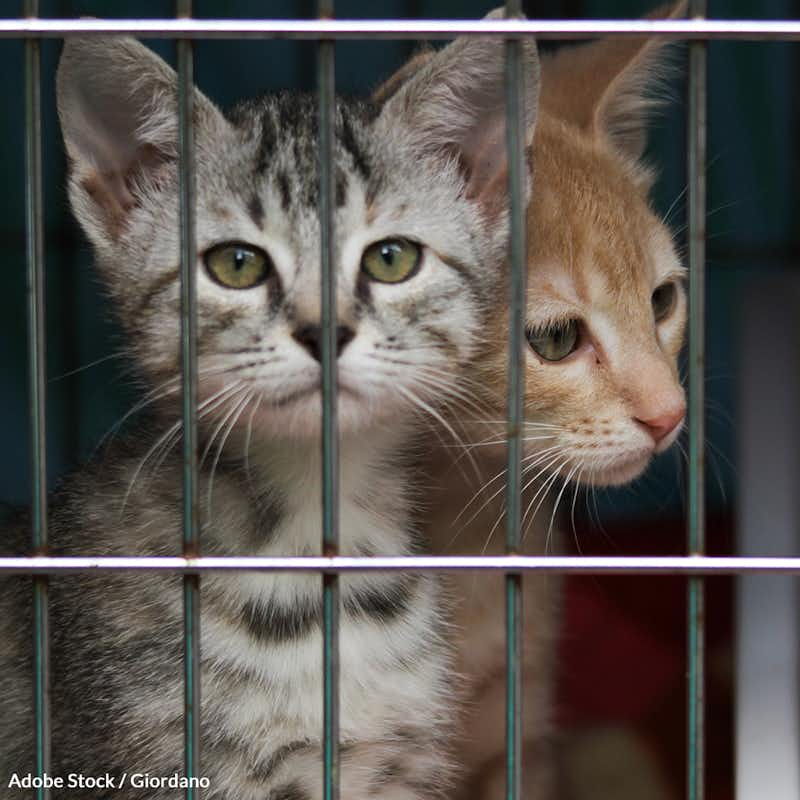Stop Gruesome Cat Killings At Military Bases
28,589 signatures toward our 50,000 Goal
Sponsor: The Animal Rescue Site
Horrific cat killings go against the Uniform Code of Military Justice. Tell the Military to investigate animal abuse!

Stray animals can be a major issue around military bases, especially when they threaten aircraft. How those animals are dealt with is another issue.
In Hawaii, stray cats have been targeted with blow darts1.
"It is our understanding that a group of soldiers... purchased blow dart guns while on a recent training mission to Indonesia and brought them home to Hawaii," said KAT Charities founder Dr. Karen Tyson2. "We have seen multiple cats with darts currently in them."
There were also reports of of two cats that were found mutilated near a Popeyes restaurant on base. The cats were found with their stomachs slit open — their intestines and organs spilling out3.
At bases in South Korea, similar incidents have been reported where stray cats were killed with air guns.
The Korea Herald aired one video that showed someone who seemed to be military personnel firing an air gun at a cat that was in a cage4. The incident was filmed at the Osan Air Base, which is a US Air Force base located in Pyeongtaek, Gyeonggi Province.
It was reported that cats were also shot in post at the Kunsan Air Base in Gunsan, South Korea5.
The Korea Herald received an anonymous tip that feral cats were being targeted by pellet guns as a part of the Bird/Wildlife Aircraft Striking Hazard program6.
The tipster reportedly participated in the BASH program firsthand in 2020, dropping out after a year after being upset with what was discovered.
"The man in charge at the time openly bragged to me how he loved to shoot anything because he was authorized to do so, and he especially liked trying to get the cats," the tipster told the Korea Herald.
The BASH program was initially implemented to keep runways clear of animals. Airmen use predator calls, noise cannons and shotguns to deter pests.
According to the tip, animals are being killed indiscriminately, even when they are far from the runway.
"I found the cat about a mile from the aircraft flightline, meaning it didn't pose any risk to aircraft, and because it was near the populated part of the base, it never shouldve been shot there," he said.
A statement from the U.S. Army Garrison Hawaii holds that these killings go against the Army's protocol7:
According to the Uniform Code of Military Justice Article 134, animal abuse is illegal, and anyone convicted could be fined, imprisoned, or dishonorably discharged from the military8.
Help us ensure stray animals like feral cats are treated in a humane way. Sign the petition and ask the Department of Defense to investigate these killings and enforce Article 134!
- KAT Charities, Facebook (2 June 2022), "Facebook post."
- Kathryn Doorey, KITV (3 June 2022), "Warnings of cat abuse, mutilations on Schofield Army Barracks | UPDATE."
- Chelsee Yee, KHON2 (2 June 2022), "Cats found shot, mutilated on Hawaii military base."
- Park Han-na, The Korea Herald (24 May 2022), "Shooting of stray cats by US troops causes controversy."
- 2nd Lt. Benjamin Aronson, 15th Wing Public Affairs, Kunsan Air Base, (25 June 2020), "Pest Management on how to manage pests."
- Park Han-na, The Korea Herald (31 March 2022), "Cats shot dead at US air base in Gunsan: tipster."
- Ron Dicker, Yahoo! Finance (3 June 2022), "Charity Accuses Soldiers Of Blow-Dart Attacks On Stray Cats At Hawaii Army Barracks."
- Manual for Courts-Martial (MCM), 2012 Edition, Uniform Code of Military Justice, "Article 134."
The Petition:
To the Department of Defense and court-martial convening authorities,
Stray animals can be a major issue around military bases, especially when they threaten aircraft. However, How those animals are dealt with is another issue, one that the Uniform Code of Military Justice defines clearly in Article 134.
This article holds animal abuse illegal, with the punishment of fines, imprisonment, or dishonorable discharge from the military for anyone convicted of such a crime.
In Hawaii, stray cats have been targeted with blow darts. At bases in South Korea, similar incidents have been reported where stray cats were killed with air guns.
These incidents show the cruel and inhumane treatment of animals that posed little threat to military operations. One video shows a cat, already in a cage, being shot and killed with an air rifle. Reports from a member of the Bird/Wildlife Aircraft Striking Hazard (BASH) program were so disturbing, the individual left the group after one year.
Allowing heinous acts of animal abuse to continue not only degrades the integrity of our military, it can be traumatic on those responsible for the abuse, sometimes escalating into violence against humans later on.
Clearly, the best course of action is one the reduces inhumane pain and suffering on animals and humans alike.
I implore you to uphold Article 134 of the Uniform Code of Military Justice, investigate these inhumane killings at U.S. Air Bases in Hawaii and South Korea, and hold accountable those responsible for animal abuse.
Sincerely,